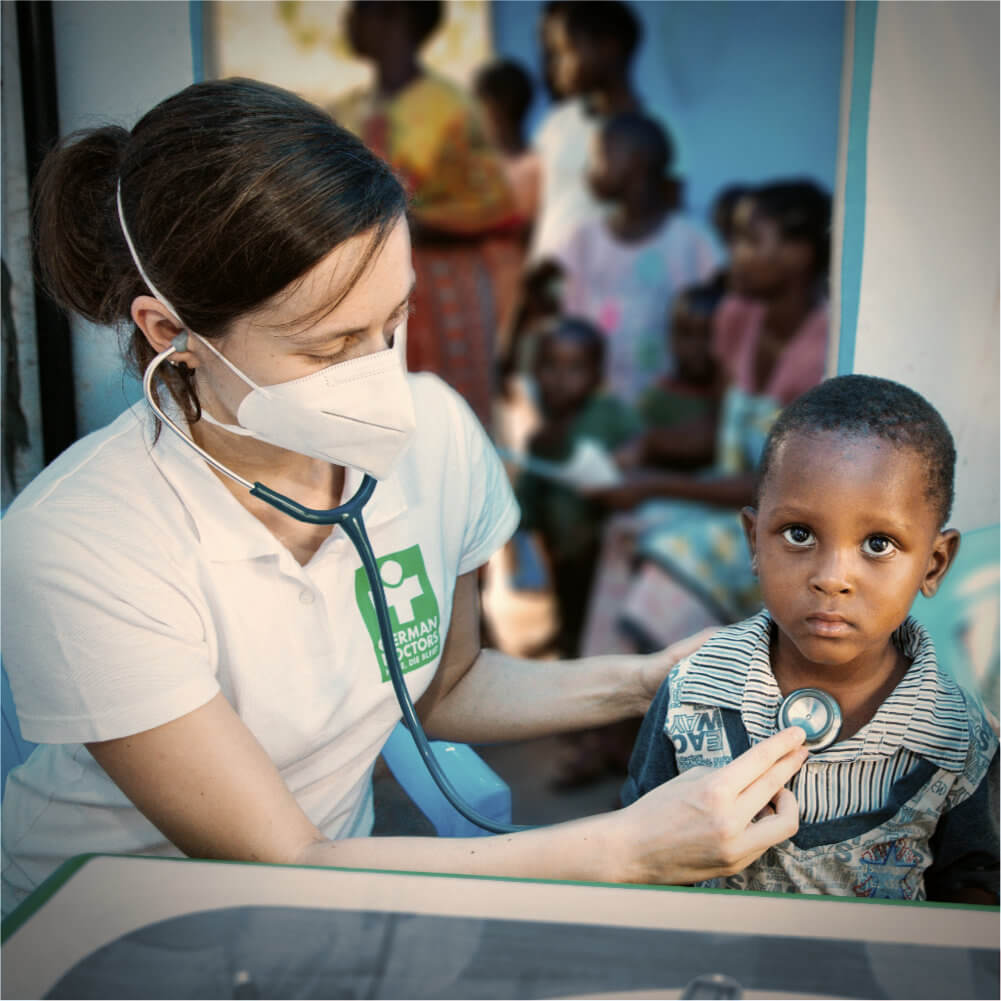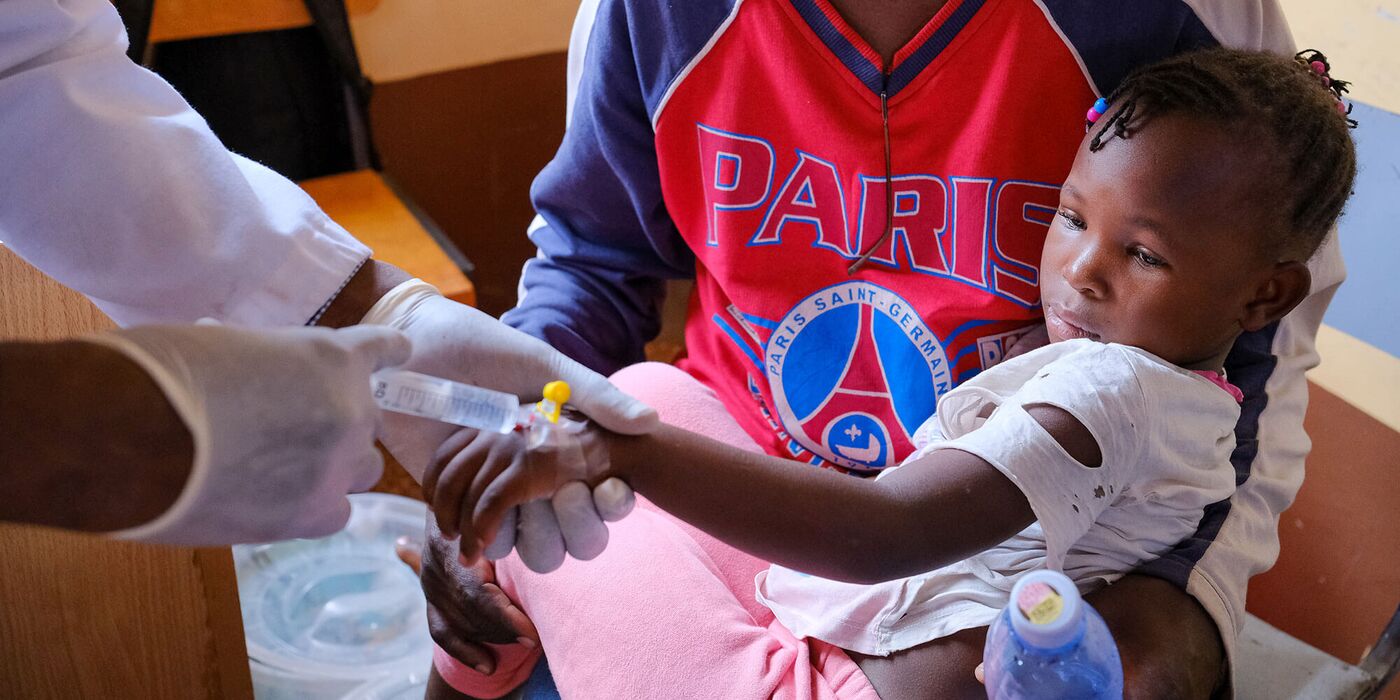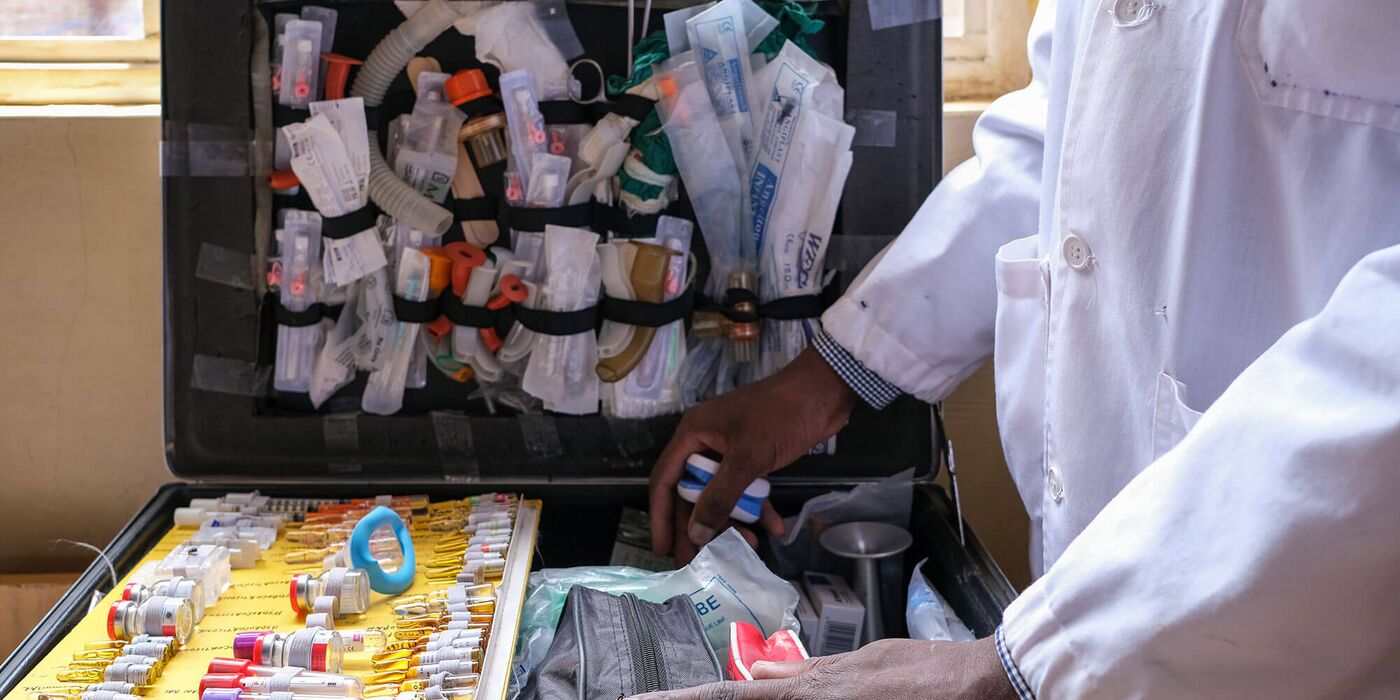Our Korogocho project
Survey
Surviving in Garbage
Filthy waterways filled with garbage run through the narrow paths, and millions of flies besiege the modest dwellings. The rotton smell of burned rubbish is everywhere. Dark smoke full of poisonous gasses blows over the slumdwellers‘ huts day and night. That is Korogocho, which means ‟confusion, chaos, garbageˮ.
It is actually unbearable, but a majority of the population here lives from the garbage dump. A microeconomy based on the garbage dump has existed for a long time in Korogocho. The wandering garbage collecters are at the bottom of the hierarchy. Most of them are children who look for something to eat or something reusable, as rubbish from tourist hotels and airports lands in the dump. Scrap metal, screws, glass, and even breadcrumbs are collected and then offered for sale on the streets.






Once a month a team from our outpatient clinic in Mathare Valley in Nairobi goes to Korogocho to provide medical treatment. Three volunteer German doctors and about 30 local co-workers treat approximately 400 patients every last Saturday in the month. The days are long and strenuous, as the consultations with the German doctors are the only access most of these people have to medical care. Aside from free medical treatment, the team offers prevention and health education on site.
Surviving in Garbage
Filthy waterways filled with garbage run through the narrow paths, and millions of flies besiege the modest dwellings. The rotton smell of burned rubbish is everywhere. Dark smoke full of poisonous gasses blows over the slumdwellers‘ huts day and night. That is Korogocho, which means ‟confusion, chaos, garbageˮ.
It is actually unbearable, but a majority of the population here lives from the garbage dump. A microeconomy based on the garbage dump has existed for a long time in Korogocho. The wandering garbage collecters are at the bottom of the hierarchy. Most of them are children who look for something to eat or something reusable, as rubbish from tourist hotels and airports lands in the dump. Scrap metal, screws, glass, and even breadcrumbs are collected and then offered for sale on the streets.
Once a month a team from our outpatient clinic in Mathare Valley in Nairobi goes to Korogocho to provide medical treatment. Three volunteer German doctors and about 30 local co-workers treat approximately 400 patients every last Saturday in the month. The days are long and strenuous, as the consultations with the German doctors are the only access most of these people have to medical care. Aside from free medical treatment, the team offers prevention and health education on site.
Dates & Facts
Beginning: The first consultations took place in Korogocho at the beginning of 2020.
Number of doctors: Three German Doctors are generally present during outreach periods in our Nairobi project. Some German Doctors from the Athi-River Project also support the one-day consultations in Korogocho.
Patient contacts: Around 400 patients are treated in Korogocho on one day.
Partner: The local Ayiera Initiative (AI), which was founded by Hamilton Ayiera, a former football player in the Kenian National Team, is a partner. The Initiative offers a number of services and supports children and youth in the Korogocho Slum, especially in the field of sports. Our medical consultations take place in Ayiera Initiative’s Youth Center. This cooperation gives us good access to the local population and provides a greater range to the programs already offered by the Initiative.




Structure: The German Doctors hold daylong consultations together with about 30 local coworkers within the framewowrk of the ̔outreach’ in Korogocho once a month. Treatments are presently provided in the Youth Center located in the middle of the slum. Seriously ill patients are also referred to the outpatient clinic in Mathare Valley or other hospitals when necessary.
Most common health problems: Chronic diseases, like diabetes and hypertension, pulmonary diseases, diseases of the gastro-intestinal tract, skin diseases, malaria, tuberculosis, undernourishment, and HIV/aids are most commonly seen.
Priorities: We concentrate on basic medical care for the surrounding population. Pregnant women come regularly for prenatal care, and young mothers come for treatment with their children. Patients with HIV and people with chronic diseases receive their medication there regularly. Prevention and health education are provided together with the coworkers from the Ayiera Initiative.
Beginning: The first consultations took place in Korogocho at the beginning of 2020.
Number of doctors: Three German Doctors are generally present during outreach periods in our Nairobi project. Some German Doctors from the Athi-River Project also support the one-day consultations in Korogocho.
Patient contacts: Around 400 patients are treated in Korogocho on one day.
Partner: The local Ayiera Initiative (AI), which was founded by Hamilton Ayiera, a former football player in the Kenian National Team, is a partner. The Initiative offers a number of services and supports children and youth in the Korogocho Slum, especially in the field of sports. Our medical consultations take place in Ayiera Initiative’s Youth Center. This cooperation gives us good access to the local population and provides a greater range to the programs already offered by the Initiative.
Structure: The German Doctors hold daylong consultations together with about 30 local coworkers within the framewowrk of the ̔outreach’ in Korogocho once a month. Treatments are presently provided in the Youth Center located in the middle of the slum. Seriously ill patients are also referred to the outpatient clinic in Mathare Valley or other hospitals when necessary.
Most common health problems: Chronic diseases, like diabetes and hypertension, pulmonary diseases, diseases of the gastro-intestinal tract, skin diseases, malaria, tuberculosis, undernourishment, and HIV/aids are most commonly seen.
Priorities: We concentrate on basic medical care for the surrounding population. Pregnant women come regularly for prenatal care, and young mothers come for treatment with their children. Patients with HIV and people with chronic diseases receive their medication there regularly. Prevention and health education are provided together with the coworkers from the Ayiera Initiative.
Conslultation in the slum
Treatment on the edge of the garbage dump
9:00 in the morning in the Ayiera Youth Center in Korogocho: The German Doctors’ consultations have just begun, but the waiting room is already almost full. Word-of-mouth spread quickly that the German Doctors hold consultations in the large rooms in the Youth Center in the middle of the Korogocho slum on the last Saturday of each month.
The team consisting of about 30 individuals from our project in Mathare Valley in Nairobi left for `outreach’ in Korogocho early in the morning. Two ambulances have been packed with medical equipment and medicines for the improvised treatment rooms on site. The local coworkers, including nurses, laboratory technicians, pharmacists, and translators, work hand in hand with the volunteer mission doctors from Germany.




Substantial aid with limited resources
The enormous poverty and life in the immediate surroundings of the huge, spreading garbage dump leave obvious traces in the population. Diarrhea, food poisoning, asthma, and worm infestation are common. Scars provide evidence of the many injuries and skin diseases that people acquire during their daily struggle for survival on the garbage dump. The procedures are performed as quickly and efficiently as possible in the improvised out-patient rooms on outreach days, and there is hardly any time for a short pause. Sterile dressings are applied, and antibiotics, anti-inflammatory drugs, deworming medication, and eye drops are prescribed. Simple laboratory examinations enable important diagnoses to be made. Children and emergencies are initially treated in extra rooms; especially difficult cases are referred to our out-patient clinic in Nairobi or to other hospitals. The need for medical care is enormous and should be further expanded.
Treatment on the edge of the garbage dump
9:00 in the morning in the Ayiera Youth Center in Korogocho: The German Doctors’ consultations have just begun, but the waiting room is already almost full. Word-of-mouth spread quickly that the German Doctors hold consultations in the large rooms in the Youth Center in the middle of the Korogocho slum on the last Saturday of each month.
The team consisting of about 30 individuals from our project in Mathare Valley in Nairobi left for `outreach’ in Korogocho early in the morning. Two ambulances have been packed with medical equipment and medicines for the improvised treatment rooms on site. The local coworkers, including nurses, laboratory technicians, pharmacists, and translators, work hand in hand with the volunteer mission doctors from Germany.
Substantial aid with limited resources
The enormous poverty and life in the immediate surroundings of the huge, spreading garbage dump leave obvious traces in the population. Diarrhea, food poisoning, asthma, and worm infestation are common. Scars provide evidence of the many injuries and skin diseases that people acquire during their daily struggle for survival on the garbage dump. The procedures are performed as quickly and efficiently as possible in the improvised out-patient rooms on outreach days, and there is hardly any time for a short pause. Sterile dressings are applied, and antibiotics, anti-inflammatory drugs, deworming medication, and eye drops are prescribed. Simple laboratory examinations enable important diagnoses to be made. Children and emergencies are initially treated in extra rooms; especially difficult cases are referred to our out-patient clinic in Nairobi or to other hospitals. The need for medical care is enormous and should be further expanded.
Living conditions
Struggle for survival
"I cannot forget these scenes: millions of flies, an uncountable number of birds, and people in the middle, all searching for something to eat. Mission doctor, Peter Hartmann describes the area, “A pungent stink lies over the largest garbage dump in Nairobi, innumerable huts with corrugated tin roofs crowd on the edge, and the poverty affects me like a blow in the face.
Trash has accumulated at Dondora, the biggest garbage dump in Nairobi (population = four million) for around 50 years. Power shovels mix the increasing amounts of garbage and dump new refuse day and night. They are surrounded by people looking for usable or reusable things. Some families specialize in old glass or plastic waste. Innumerable people search for food that is thrown away in the gated communities, which can afford waste removal. The amount of waste that accumulates there, where a minority of Kenyans live in luxury, has been increasing for years. Add the waste from tourist hotels and aircraft, which is cheaply deposited here. Hospital waste, like expired medication or old oil also land here untreated. The stink and flies are absolutely unbearable, especially during the rainy season.





The pandemic and the war in the Ukraine only increase the poverty
The huge slum, Korogocho, got established at the foot on the garbage dump. It consists of a tangle of narrow paths and mud dwellings with roofs of corregated tin or other available materials. Filthy waterways filled with trash run through the narrow paths. Fresh water, toilets, and a functioning sewage system are almost completely lacking. Only a small portion of the estimated 200,000 inhabitants make a living in formal jobs, above all in the surrounding industrial areas. Poverty has recently increased. Food waste from the hotels and airports was no longer available at the dump during the pandemic; thousands of people were threatened by starvation. The German Doctors helped out with food packages. The climate change has caused harvests to fail, and a lack of wheat due to the war in the Ukraine has driven food prices sky high. This is especially catastrophic for people living at the edge of society!
Struggle for survival
"I cannot forget these scenes: millions of flies, an uncountable number of birds, and people in the middle, all searching for something to eat. Mission doctor, Peter Hartmann describes the area, “A pungent stink lies over the largest garbage dump in Nairobi, innumerable huts with corrugated tin roofs crowd on the edge, and the poverty affects me like a blow in the face.
Trash has accumulated at Dondora, the biggest garbage dump in Nairobi (population = four million) for around 50 years. Power shovels mix the increasing amounts of garbage and dump new refuse day and night. They are surrounded by people looking for usable or reusable things. Some families specialize in old glass or plastic waste. Innumerable people search for food that is thrown away in the gated communities, which can afford waste removal. The amount of waste that accumulates there, where a minority of Kenyans live in luxury, has been increasing for years. Add the waste from tourist hotels and aircraft, which is cheaply deposited here. Hospital waste, like expired medication or old oil also land here untreated. The stink and flies are absolutely unbearable, especially during the rainy season.
The pandemic and the war in the Ukraine only increase the poverty
The huge slum, Korogocho, got established at the foot on the garbage dump. It consists of a tangle of narrow paths and mud dwellings with roofs of corregated tin or other available materials. Filthy waterways filled with trash run through the narrow paths. Fresh water, toilets, and a functioning sewage system are almost completely lacking. Only a small portion of the estimated 200,000 inhabitants make a living in formal jobs, above all in the surrounding industrial areas. Poverty has recently increased. Food waste from the hotels and airports was no longer available at the dump during the pandemic; thousands of people were threatened by starvation. The German Doctors helped out with food packages. The climate change has caused harvests to fail, and a lack of wheat due to the war in the Ukraine has driven food prices sky high. This is especially catastrophic for people living at the edge of society!


















